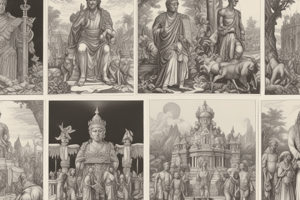Podcast
Questions and Answers
What distinguishes history from prehistory?
What distinguishes history from prehistory?
- Prehistory has written records.
- History is based on oral traditions.
- Prehistory is a study of current events.
- History has written records. (correct)
Which best describes the term 'herstory'?
Which best describes the term 'herstory'?
- History written from the perspective of women. (correct)
- A historical narrative focused on significant dates.
- A study of oral traditions across cultures.
- A chronological account of famous wars.
According to Herodotus, how is history defined?
According to Herodotus, how is history defined?
- The study of past societies and events. (correct)
- The chronological listing of past events.
- The acceptance of previous knowledge.
- An inquiry into future possibilities.
What is one characteristic of history as a discipline?
What is one characteristic of history as a discipline?
Which of the following is NOT a method through which history is documented?
Which of the following is NOT a method through which history is documented?
What role do artifacts play in the study of history?
What role do artifacts play in the study of history?
Which assertion accurately contrasts history and the past?
Which assertion accurately contrasts history and the past?
How has the study of history evolved in the last hundred years?
How has the study of history evolved in the last hundred years?
What does historiography primarily deal with?
What does historiography primarily deal with?
What is the main idea behind positivism in history?
What is the main idea behind positivism in history?
What is one objective of post-colonial historiography?
What is one objective of post-colonial historiography?
According to the information, which statement about historical facts is true?
According to the information, which statement about historical facts is true?
What is a common criticism regarding the writing of history?
What is a common criticism regarding the writing of history?
What is essential for historical research according to the content?
What is essential for historical research according to the content?
Who is recognized as the 'Father of Post-Colonialism'?
Who is recognized as the 'Father of Post-Colonialism'?
What does the phrase 'no document, no history' signify in historical inquiry?
What does the phrase 'no document, no history' signify in historical inquiry?
Flashcards
History
History
The study of the past, including people, societies, events, and challenges.
Herodotus
Herodotus
The Father of History who lived from 485 B.C. to 425 B.C.
Historia
Historia
Greek word meaning knowledge gained through inquiry or investigation.
Historical Account
Historical Account
Signup and view all the flashcards
The Past
The Past
Signup and view all the flashcards
History
History
Signup and view all the flashcards
Prehistory
Prehistory
Signup and view all the flashcards
Herstory
Herstory
Signup and view all the flashcards
Historiography
Historiography
Signup and view all the flashcards
Importance of Historiography
Importance of Historiography
Signup and view all the flashcards
Positivism
Positivism
Signup and view all the flashcards
No Document, No History
No Document, No History
Signup and view all the flashcards
Post-colonialism
Post-colonialism
Signup and view all the flashcards
Postcolonial History
Postcolonial History
Signup and view all the flashcards
Postcolonialism
Postcolonialism
Signup and view all the flashcards
Historical Methodology
Historical Methodology
Signup and view all the flashcards
Study Notes
Nature of History
- History is the study of the past, encompassing people, societies, events, and challenges.
- Herodotus, known as the Father of History, lived from 485 B.C. to 425 B.C.
- Greek word "historia" means knowledge gained through inquiry or investigation.
- History serves as an account of the past through written documents and historical evidence.
- Typical focus areas in history include wars, revolutions, and significant breakthroughs.
History Differentiation
- History vs. Past: The past includes everything that has ever occurred, while history interprets and narrates these events.
- History vs. Prehistory: History relies on recorded events; prehistory denotes human activities before writing systems were established.
- History vs. Herstory: Herstory represents history from a female perspective, often critiquing traditional male-centric narratives.
Questions and Issues in History
- Key questions in the study of history include: What? Who? Where? When? How? Why?
- Historiography is the study of historical writing, examining how history is constructed and interpreted.
- Importance of historiography lies in understanding the context, authorship, and source material of historical texts.
Positivism and Historical Evidence
- Auguste Comte, the Father of Positivism, emphasized the importance of evidence and objectivity in historical writing.
- The concept "no document, no history" underscores reliance on tangible evidence for historical validity.
- Post-colonialism explores how colonized societies understand their identity and heritage after colonialism.
Post-Colonialism Perspectives
- Postcolonial history seeks to reclaim national narratives separate from colonial interpretations.
- Critiques colonial methods and effects, presenting a counter-narrative to traditional historical accounts.
- Acknowledges the bias that history is often written by victors, raising questions about objectivity.
Role of Historians
- Historians actively seek and interpret historical evidence and facts.
- Facts require contextualization and organization to form a coherent narrative.
- Historians face the challenge of subjectivity in their interpretations influenced by personal context and circumstances.
- Historical methodology involves specific techniques that ensure accuracy in research and writing.
Studying That Suits You
Use AI to generate personalized quizzes and flashcards to suit your learning preferences.




